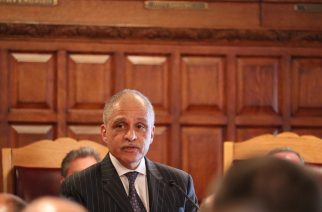
Editor’s note: Ophelia Xie is a student at SUNY New Paltz who is interning at The Legislative Gazette for the spring 2020 semester. In this first-person story, she recounts her experiences in China during the outbreak of the COVID-19 virus.
I have not celebrated the Lunar New Year for seven years since I moved to New York. This year, I flew to the other side of the world and planned to indulge in the most important holiday in China, but the 2020 Lunar New Year was nothing as I expected. Instead of celebrating the beginning of the year with festivities and fireworks, China had to tackle a surprising outbreak that has sickened thousands of people.
Before Lunar New Year
I was on my way to Macau on January 22 when my friend told me about the new coronavirus. A man next to us was sneezing nonstop, but I did not pay attention to him as I was crossing the Chinese-Macau border in Zhuhai, the city connected Mainland China and Macau. Later that day, the local media announced three confirmed cases in Zhuhai and one in Macau. I started to cover my nose and mouth with a face mask.
The outbreak of the new coronavirus, also called 2019-nCoV, began as the Chinese prepared for the New Year that was on January 25. The virus is believed to have originated in mid-December last year at Huanan Seafood Market in Wuhan, the capital city in Hubei Province. At first, it was transmitted in Wuhan only. Wuhan authorities thought the epidemic was under control and allowed 5 million people to leave the city during chunyun, a 15-day travel rush before Lunar New Year. It was the time of the year when people go home from the year-long work.
The virus traveled the country along with these people. The Chinese media soon reported hundreds of cases in the cities outside of Wuhan. In Guangzhou, the number of cases raised from single digit to double digits in a single day. The government decided to seal Wuhan city on January 23.
YongHui Chen, 27, is a third-year graduate student and an intern at Tongji Hospital in Wuhan. Chen said he has heard “rumors” about a new virus like SARS appearing in Wuhan. The rumors started and quickly spread in WeChat, a social media platform around mid-December, but the local authorities immediately shut down the information. No one was expecting the “rumors” would become an actual outbreak a month later.
“I want to go home when it [the outbreak] happened,” Chen said in Chinese. “But I was worried I might be infected. I don’t want to spread this [virus] to my family and relatives back home.”
Chen spent a couple of days in a self-imposed quarantine and left Wuhan three days before the city locked down its border on January 23. He took the train back to Jiangmen, a city in Guangdong Province that is about 650 miles south of Wuhan. The epidemic had not yet arrived in Jiangmen on the day he returned. Chen recalled that wearing a face mask seemed odd there, and people continued their daily work and the on-going preparation for the New Year.
I asked Chen if he saw any significant impacts due to the virus in Wuhan, he answered no.
“I didn’t see people wearing face masks in the streets when I left Wuhan,” Chen said. “People in Jiangmen also didn’t take any precautions against this epidemic. They were still hanging out at crowded restaurants.”
When I heard the news of the virus outbreak, I immediately urged my family to buy more face masks and wear them in the public areas, even though there were less than 10 percent of people wearing masks in the streets. My parents rejected putting on masks and jokingly said only the youth would wear masks because they are always afraid of death.
The panic spread more rapidly than the new coronavirus in Chen’s hometown. The concerns over the virus exceeded the festive atmosphere on New Year’s Eve when the health experts said the 2019-nCoV spreads through the air, and it can be easily transmitted within the crowds. The fear of the new coronavirus turned every household into a cocoon. Most people stayed indoors watching the New Year’s countdown on television.
Lunar New Year
The typical celebration of the holiday used to start with visiting the relatives in the morning, followed by festivities of lion dance and performance. The year 2020 did not start typically. Authorities demanded to cancel all annual festivities in Jiangmen to avoid the crowds on January 25, Chen said.
Chen and his family left their house to visit relatives on the first day of the Lunar New Year. They then quickly returned home for the rest of the day.
One of Chen’s classmates was not as lucky as Chen. He went back home a few days later than Chen, and the community he lives in placed him in a forced quarantine as soon as he came back. He was not allowed to leave his house.
On Weibo, a Chinese social media platform, the public was able to follow the epidemic map and the confirmed cases and fatalities every day. People started to take precautions against the virus. Face masks were quickly sold out in many pharmacies, particularly the N95 type, which can block 95 percent of viruses.
Stores like Starbucks rejected customers who did not wear face masks starting on January 25. The staff of Starbucks immediately checked if I was wearing a face mask as I walked into the store craving for a cup of Latte. As soon as I ordered my drink, they had the temperature gun ready to test if I had a fever.
Legislative Gazette photo by Zhuoxing Lin. Local residents line up outside of a pharmacy to purchase face masks in Macau.
After the New Year
The concerns of the epidemic escalated on January 26 when a big crowd rushed to the food markets to purchase rice and instant food. Meat and fresh vegetables were in high demand even though they were twice as expensive. People feared a shortage of food due to the outbreak of 2019-nCoV.
Meanwhile the authorities took a further step to prevent the epidemic, requiring the public to wear face masks in public areas and closing catering services, malls and any forms of assembly.
Chen and his family found out the temple they used to worship at was closed.
“There was nowhere to go and nowhere to celebrate because everything was shut down,” Chen said.
All schools in China extended the holiday and postponed the new school session. Chen and his classmates are now awaiting the school to notify them of the return date.
“I hope they will find the treatment for this epidemic soon, and we can all return to our normal life,” Chen said.
The first case in Jiangmen was announced as I was going through temperature tests in the Beijing Capital International Airport on January 29. Everyone entered the airport with face masks, some even wore two or three masks. I passed two temperature tests and completed a health survey to leave the country.
I returned to New York a few days before the U.S. closed borders to the Chinese travelers. The U.S. border security was asking the travelers where they have been in China, but they passed me without asking a question or asking me to remove my face mask. The only thing they said was “welcome back.”










